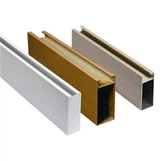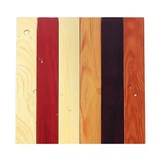Hey there! I'm a supplier of Aluminum Composite Panels, and today I wanna talk about a super important question: Can aluminum composite panels resist common chemicals?
First off, let's understand what aluminum composite panels are. They're made up of two thin aluminum sheets bonded to a non - aluminum core. These panels are super popular for a bunch of reasons. They're lightweight, easy to install, and have a sleek appearance, which makes them great for things like building facades, signage, and interior decoration.
Now, let's get into the nitty - gritty of chemical resistance. There are a whole bunch of common chemicals out there that these panels might come across in different environments.
Acids
Acids are everywhere, from industrial settings to household cleaners. Weak acids, like acetic acid (the stuff in vinegar), usually don't cause much damage to aluminum composite panels. The aluminum surface has a thin oxide layer that acts as a protective shield. This layer forms naturally when aluminum is exposed to air and helps prevent corrosion to some extent.
However, strong acids are a different story. Sulfuric acid and hydrochloric acid can eat away at the aluminum. These acids can react with the aluminum and break down the protective oxide layer. Once that layer is gone, the aluminum starts to corrode rapidly. If your building's facade or signage is exposed to an environment with high levels of strong acids, say in a chemical factory area, you might see the panels start to pit, discolor, or even develop holes over time.
Bases
Bases, also known as alkalis, can also have an impact on aluminum composite panels. Mild bases, like baking soda solutions, are generally okay. But strong bases, such as sodium hydroxide, can be quite harmful. The hydroxide ions in strong bases react with the aluminum, causing it to dissolve. This can lead to structural weakening of the panels. For example, in a wastewater treatment plant where there are high concentrations of alkaline chemicals, the aluminum composite panels used for enclosures or partitions need to be carefully considered.
Solvents
Solvents are used in a lot of industries, from painting to cleaning. Some common solvents include acetone, toluene, and xylene. These solvents can affect the appearance and integrity of aluminum composite panels. If you use a solvent - based cleaner on the panels, it might dissolve the protective coatings on the surface. This can make the panels more vulnerable to other chemicals and environmental factors. Over time, the panels may lose their shine, and the color might fade.
But it's not all bad news. There are ways to improve the chemical resistance of aluminum composite panels.
Coatings
Applying a high - quality protective coating is one of the best ways. There are different types of coatings available, such as powder coatings and fluorocarbon coatings. Powder coatings are durable and can provide good protection against a variety of chemicals. Fluorocarbon coatings, on the other hand, are even more resistant. They have excellent weatherability and chemical resistance. They can withstand exposure to UV rays, acids, bases, and solvents for a long time.
Core Material
The choice of core material in the aluminum composite panel also matters. Some core materials are more resistant to chemicals than others. For example, a mineral - filled core is generally more chemically stable compared to a polyethylene core. The mineral - filled core can better withstand the effects of chemicals and is less likely to break down or deform when exposed to them.
As a supplier, I've seen firsthand how important it is to consider chemical resistance when choosing aluminum composite panels. For instance, if you're using these panels for a building in a coastal area, where there's salt in the air (which is a form of chemical), you need to make sure the panels can resist corrosion. Or if you're using them in a food processing plant, where there are cleaning agents and acids from food products, chemical resistance is crucial.
Let's talk about some of the products we offer. We have the Aluminum Composite Roof Panel. This panel is designed to be durable and can withstand a variety of environmental factors, including some chemical exposure. It's a great choice for roofing applications where you need a lightweight yet strong material.


Our Aluminum Profiled Cladding Sheet is another excellent option. It has a unique profile that not only adds an aesthetic touch but also provides good protection. It can be used for building facades, and with the right coatings, it can resist common chemicals.
And then there's our Colorful Aluminium Composite Panel. These panels come in a variety of colors, which is great for creating eye - catching signage or interior decorations. They're also treated to have a certain level of chemical resistance so that the colors don't fade easily.
If you're in the market for aluminum composite panels, it's really important to assess your specific needs. Think about the environment where the panels will be used, the types of chemicals they might be exposed to, and the level of chemical resistance you require.
We're here to help you make the right choice. Whether you're an architect, a contractor, or a business owner looking for the perfect panels for your project, we can provide you with the information and products you need. Don't hesitate to reach out to us to discuss your requirements and start a procurement negotiation. We're confident that we can offer you high - quality aluminum composite panels that meet your chemical resistance needs.
In conclusion, while aluminum composite panels have some natural resistance to certain common chemicals, the extent of that resistance depends on many factors. With the right coatings, core materials, and proper selection, you can ensure that your panels last a long time and perform well in different chemical environments.
References
- "Corrosion of Aluminum and Its Alloys" by G. P. Tikhomirov
- "Handbook of Corrosion Data" by Bruce D. Craig




